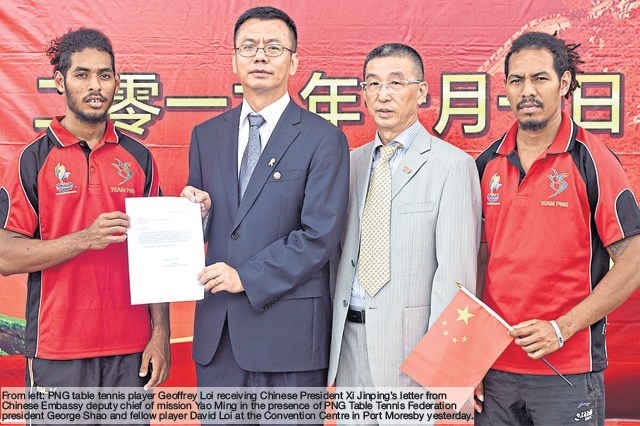George Shao is nobody's tool. The president of the Papua New Guinea Table Tennis Federation, Shao (pictured, second from right) wants to focus on developing the sport he loves in his country. Things got complicated when he asked for help from China. Shao met key figures in China's renowned table tennis infrastructure while attending ITTF meetings, including the president of the China Table Tennis College. When Shao asked him for pointers in developing Papua New Guinea's table tennis program, he was surprised by the response. "I approached him and asked if he could help PNG operations," recalled Shao. "He asked me to send a team over." Soon, the governments of both nations were involved, and the press began invoking the famous "Ping-Pong Diplomacy" between China and the United States nearly fifty years ago. Shao, however, wants to make it clear that he wants no part of any political agenda. "It sounds like politics but one thing I want to stress is a lot of media get involved and say 'table tennis diplomacy,'" says Shao. "I felt very annoyed — I am not interested in politics, I am not a part of Chinese politics. This is purely community service, but I just utilized personal relationships." Like it or not, however, Shao was a key part of a chain reaction that led to his table tennis team meeting Chinese President Xi Jinping. "I approached the PNG government, who approached the Chinese ambassador," Shao explained. "Athletes were very happy because this was a very real opportunity and the next thing they were shaking hands with the Chinese President." While Shao wishes to stay out of political entanglements, such appearances are unavoidable, especially in light of China's global investment campaign entitled the "Belt and Road Initiative." This campaign, already active in over 70 countries, often uses table tennis as a diplomatic tool to open doorways into resource-rich developing nations. This pattern perfectly fits the situation in PNG, which China classifies as a "prospective member" of the Belt and Road Initiative. PNG, with vast untapped resources in its mountainous interior, is already in debt to China to the tune of roughly $2 billion. Strapped for cash, PNG will have little choice but to accept China's generous offers to develop its infrastructure. The resources will then flow back to China along the "silk road" of maritime trade routes. This practice is described by critics as "debt-trap diplomacy." While Shao and his table tennis team prefer to focus on developing their table tennis skills, they find themselves caught up in an international game of chess. Just don't ask Shao to smile and play along.
More at The Australian
